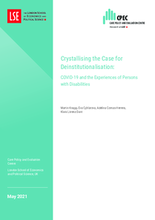Displaying 1011 - 1020 of 4424
The aim of this survey is to capture the views, experiences, and ideas of children and young people with experience of alternative care in order to help feed into and guide the discussions at the 2021 UNCRC Day of General Discussion focused on Child Rights and Alternative Care.
"Orphanage volunteering and the industry that has emerged to support it have contributed to a system in Kenya and other parts of the world that creates a demand for institutions and children," writes Michelle Oliel of Stahili in this opinion piece for CNN.
In this webinar, members of the International Parent Advocacy Network discussed parent advocacy and presented the literature review International Review of Parent Advocacy in Child Welfare: Strengthening Children's Care and Protection Through Parent Participation. The webinar included presentations from parent advocates who shared examples of parent advocacy in their contexts.
The third session of the World Bank Group's ECD webinar series will focus on the Scaling Up Measurement in Early Childhood Initiative at the World Bank, which works to support countries to measure early childhood outcomes and the quality of early learning environments together while promoting the generation of globally-comparable reliable data.
In this webinar, the International Parent Advocacy Network will discuss the literature review 'International Review of Parent Advocacy in Child Welfare: Strengthening Children's Care and Protection Through Parent Participation.'
The third session of the World Bank's ECD webinar series will focus on the Scaling Up Measurement in Early Childhood Initiative at the World Bank, which works to support countries to measure early childhood outcomes and the quality of early learning environments together while promoting the generation of globally-comparable reliable data.
The International Data Alliance for Children on the Move (IDAC) is organizing a webinar to shed light on the emerging impact of COVID-19 on migrant and displaced boys and girls, using available albeit limited evidence.
The goal of the present study was to provide data on pre-trip preparation, in-country activities, and how these impacted volunteer perceptions of preparation and trip satisfaction for volunteers working with vulnerable children, including those in residential care (ex. orphanages).
In this webinar, prevention experts discuss the process, experiences, and challenges of the ongoing integration of IPV prevention and gender into the Investing in Children and their Societies (ICS) Skilful Parenting Programme, and inclusion of VAC in the Indashyikirwa couples IPV prevention programme.
Millions of persons with disabilities, children and older persons live in congregate settings. Whilst the motivation for providing such care may be well-intentioned, that is not always the case. Many of those settings are ‘institutional’, with residents denied autonomy and choice, provided with poor quality health and social care, and experiencing social isolation, neglect or abuse. This report summarises the evidence and experiences of persons living in congregate settings in general, and in terms of the impact of COVID-19, to understand the barriers to deinstitutionalisation, and to highlight the approaches that have sought to overcome those barriers.

